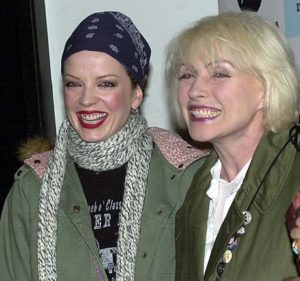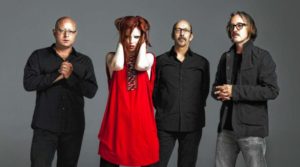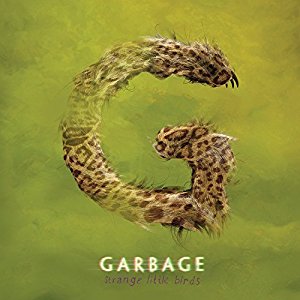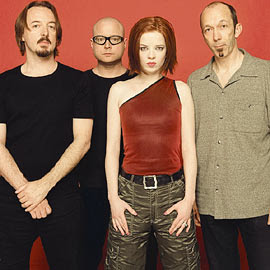I was not sure what to expect when I was given the opportunity to interview Butch Vig. As a producer, he has been behind some of the most intense records from the last 30 years. As a member of the band Garbage, he has been an integral piston in an engine that continues to crank out energetic, visceral, and challenging rock music to this day. With these in mind, one expects Vig to be equally intense. Yet our phone conversation revealed a super-chill, very thoughtful individual who is committed to a high degree of fairness and excellence in his own band, as well as the bands he’s worked with.
For those who don’t know, after Fire Town, a band he shared with future Garbage-mates Doug Erikson (multi-instrumentalist) and Steve Marker (audio engineer), Vig went on to heights of notoriety as a producer. To name just a few: The Smashing Pumpkins’ Siamese Dream, Foo Fighters’ Wasting Light, Let Your Dim Light Shine from Soul Asylum, New Wave by Against Me!, and more. I’m leaving a few examples out, if you’ve read this far, you already know them. Garbage debuted in 1995 and, amid the guitar-drenched sound of alt-rock that Vig was an integral architect of, came a savvy guitar and synth ethos that not only shook up the status quo, but informed decades of rock to come.
Garbage is on tour this year, co-headlining with Blondie, which is touring their new album Pollinator. Garbage will be supporting their 2016 album Strange Little Birds, but Vig is adamant that you’ll get what you’re looking for from a Garbage tour. But…how did this pair-up come to pass?
Well, Shirley (Manson) and Debbie Harry have known each other for a long time. They’re thick as thieves. (Garbage) had been looking to do a summer run in 2017. This was discussed and we jumped at it. You know, Blondie and my mates in Garbage all jumped at the chance. We loved each other’s bands and, again, Shirley and Debbie are very close.
 I think it’s great to have two strong, iconic female-fronted rock bands playing on tour this summer. It’s a rare breed these days. There’s going to be a lot of female power coming from the stage every night, and that’s gonna be cool.
I think it’s great to have two strong, iconic female-fronted rock bands playing on tour this summer. It’s a rare breed these days. There’s going to be a lot of female power coming from the stage every night, and that’s gonna be cool.
What is the setlist looking like?
(The setlist) is going to be a mix of our entire repertoire (laughs). We’re in rehearsals now, so we’re going to try to narrow down the songs that we’re going to consider playing. There’s about forty now. We’ll probably play a bunch of the singles from all of the records, but we’ll play some stuff from Strange Little Birds, as well as…we have a new track coming out this summer called “No Horses” which hopefully we’re going to work up and see if we can whip that into shape…we’ll see if we can play that also.
I presume that for both bands, there’s going to be some retrospective considerations involved here. Any chance of some old Fire Town songs sneaking into the mix?
(Laughs.) Dw., there’s not a chance in hell that Fire Town’s gonna sneak in there!
Shirley said there’s a possibility that she and Debbie may sing some songs together. Yesterday was our first day of rehearsal, so, I don’t know yet. But we want to mix the set up in terms of what Garbage does. We’re gonna play a lot of the key tracks from the records, but we want to play some deep cuts too. We’ll try to mix that up, if for nothing else than to keep things interesting for ourselves.
And what’s the itinerary looking like for the tour?
We start on the West Coast and do that run from Seattle and work our way down to the Hollywood Bowl, then to Vegas. We’re definitely starting with the West Coast, then mid-America, and move our way to the East Coast. We’ll also have a show in Canada and at least one in Mexico City, hopefully, by the end of the tour. (For more information, click here.)
What are the differences when you are hired to be a producer for another band versus when you’re working with Garbage?
There are two different mindsets. When I’m producing Foo Fighters, Green Day, or Against Me! or whoever, it’s my job to understand their vision and to have an overview of everything, and try to keep the songs focused and the performances right. You know, it’s a totally different hat I wear (than when I’m the producer).
 When in Garbage, I’m a producer, but I’m also a songwriter and arranger. I’m a drummer, and play guitar and keyboards, I make the tea and go mix the cocktails as a band. All four of us share those responsibilities in Garbage. On any given day, everybody sort of slips into different roles. That’s one of the reasons why we’ve been around for twenty years: because there’s a lot of different creative outlets in Garbage. I’m not just the drummer, not just the bass player. I embrace all aspects of what it is to be in a band and to write and produce. That’s valid for all four of us, and what keeps it interesting for us.
When in Garbage, I’m a producer, but I’m also a songwriter and arranger. I’m a drummer, and play guitar and keyboards, I make the tea and go mix the cocktails as a band. All four of us share those responsibilities in Garbage. On any given day, everybody sort of slips into different roles. That’s one of the reasons why we’ve been around for twenty years: because there’s a lot of different creative outlets in Garbage. I’m not just the drummer, not just the bass player. I embrace all aspects of what it is to be in a band and to write and produce. That’s valid for all four of us, and what keeps it interesting for us.
Overall, the band has stayed together and stayed on the same page for a long time. Bands are complicated relationships. How has Garbage been able to make it work so consistently over the years?
We made a conscious decision when we started out to share everything equally including publishing, royalties…anything that happens to us. I’ve seen bands that I’ve produced fall apart because of power struggles, ego, because of money issues — who owns what, who is getting the most money, who is getting the most attention. U2 shares everything equally. R.E.M. shared everything equally. They both had long, healthy runs and it just made sense to us to do that. It’s one of the reasons that we have survived. But one of the big reasons is that we really get along as friends and we share a lot of the same political and artistic sensibilities, in terms of what we like and don’t like.
We’re like three nerdy brothers and their geeky sister! But sharing everything equally is a very important thing if bands want to stay together. It really helps.
What is your process when you are considering working with an artist as a producer?
One of the things I look at when I’m signing up to (work with) a band is I really want to get a sense of what their vision is. I can’t take on someone who only has a rough sketch of a song and they don’t even know what to do, or they don’t know where they want to go, arrangement-wise. I don’t really like to get into that. I know there are producers who will completely mold and sculpt an artist into the producer’s exclusive vision.
I like working with bands that written good songs and have a clear idea of what they want to make. I’m lucky, in that way, that I’ve captured some moments with bands that were in a transition from one part of how they approach their music or their art to a new direction. It’s up to me to help them get there.
I’ve noticed that when a band wants to develop in a different way, or move in a different direction, you often are a go-to for those kinds of shifts. I’m thinking about Against Me!’s Sire Records, or even Soul Asylum. There was so much riding on them after the SST albums, and then the big success of Grave Dancer’s Union. It seemed that you were the right guy for the job when it came time to balance the wilder early years with this newfound success.
That’s exciting when you can do that, because you can sense from the artist that they’re totally psyched that they can tread some new water. That’s invigorating, in the studio, when you do that. When you’re just trying to recreate what you did on your earlier records, it’s just not that much fun to do. Anytime you try to push their sensibilities into a new direction, that’s exciting.
When I talk with an artist about producing them, there’s a lot of things I look at. First, where are they with the songs? What kind of directions do they want to take? But I also look at the vibe and the politics that’s going on within the band, how emotionally stable they are. If they’re all junkies? I don’t want to produce them! I don’t want to have to deal with that mess.
 And then there are bands that I’ve turned down because they have too many personal or internal problems. To a lesser degree, I also look at how their infrastructure is set up, their management, their label, or whatever they’re doing. I want to know how their support network is. But I really want to get to know the band. I want to know their personalities. I’m generally easy-going. I think that people let their hair down, let their guard down, when they work with me. I like to get them in a position where I know them really well, and they’ve gotten to know me so well that they are less self-conscious and they take more chances. That’s how I like to work.
And then there are bands that I’ve turned down because they have too many personal or internal problems. To a lesser degree, I also look at how their infrastructure is set up, their management, their label, or whatever they’re doing. I want to know how their support network is. But I really want to get to know the band. I want to know their personalities. I’m generally easy-going. I think that people let their hair down, let their guard down, when they work with me. I like to get them in a position where I know them really well, and they’ve gotten to know me so well that they are less self-conscious and they take more chances. That’s how I like to work.
Thanks again to Butch Vig for taking the time to talk to Popdose about Garbage, his career, and working process. Special thanks to Peter Quinn at BB Gun PR for facilitating the interview.
Garbage’s latest album, Strange Little Birds, can be found at their website: Garbage.com







Comments